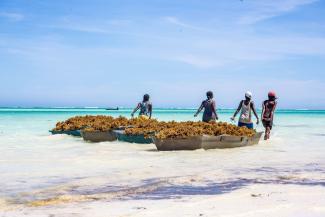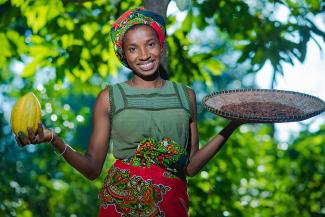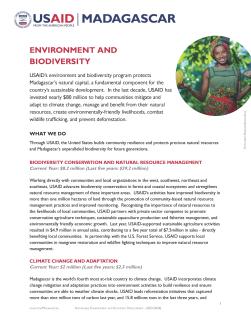USAID’s environment and biodiversity program protects Madagascar’s natural capital, a fundamental component for the country’s sustainable development. In the last decade, USAID has invested nearly $80 million to help communities mitigate and adapt to climate change, manage and benefit from their natural resources, create environmentally-friendly livelihoods, combat wildlife trafficking, and prevent deforestation.
WHAT WE DO
Through USAID, the United States builds community resilience and protects precious natural resources and Madagascar’s unparalleled biodiversity for future generations.
BIODIVERSITY CONSERVATION AND NATURAL RESOURCE MANAGEMENT
Current Year: $8.2 million (Last five years: $39.2 million)
Working directly with communities and local organizations in the west, southwest, northeast and southeast, USAID advances biodiversity conservation in forest and coastal ecosystems and strengthens natural resource management of these important areas. USAID’s activities have improved biodiversity in more than one million hectares of land through the promotion of community-based natural resource management practices and improved monitoring. Recognizing the importance of natural resources to the livelihoods of local communities, USAID partners with private sector companies to promote conservation agriculture techniques, sustainable aquaculture production and fisheries management, and environmentally friendly economic growth. Last year, USAID-supported sustainable agriculture activities resulted in $4.9 million in annual sales, contributing to a five year total of $7.5million in sales - directly benefiting local communities. In partnership with the U.S. Forest Service, USAID supports local communities in mangrove restoration and wildfire fighting techniques to improve natural resource management.
CLIMATE CHANGE AND ADAPTATION
Current Year: $2 million (Last five years: $2.5 million)
Madagascar is the world’s fourth most at-risk country to climate change. USAID incorporates climate change mitigation and adaptation practices into environment activities to build resilience and ensure communities are able to weather climate shocks. USAID leads reforestation initiatives that captured more than nine million tons of carbon last year, and 15.8 millions tons in the last three years, and participates in mangrove restoration activities that improve the health and stability of Madagascar’s coastlines and protect communities from disasters. USAID supports the development of sustainable livelihoods for climate migrants who fled drought in the south in search of a new life. To relieve pressure on protected areas and reduce social conflict, USAID provides water, seeds, climate-smart agricultural training, and improved land security to established communities and relocated migrants on over 6,000 hectares of land.
COMBATING WILDLIFE TRAFFICKING AND ENVIRONMENTAL GOVERNANCE
Current Year: $1.3 million (Last five years: $4.2 million)
Combating wildlife and natural resource trafficking and associated corruption is a persistent challenge in Madagascar. Working with a consortium of local civil society organizations, the government, and law enforcement, USAID is improving transparency, surveillance, skills, and tools to efficiently target, prosecute, and sentence traffickers. In the last five years, USAID activities led to the improved application of conservation law enforcement practices by over 2,000 enforcement officers. USAID also supports the rescue, rehabilitation, and release of tortoises back into the wild that were confiscated during wildlife trafficking attempts. USAID has rehabilitated more than 26,000 tortoises and released 3,000 back into the wild.
PARTNERSHIPS FOR CONSERVATION AND ECONOMIC GROWTH
USAID engages with the private sector to find sustainable solutions to development challenges. The Agency co-funds four public-private partnerships totaling $27.5 million of investment to conserve biodiversity and expand market-oriented, environmentally-friendly, and sustainable economic opportunities to improve community well-being and prosperity.
- Vanilla (U.S. and local partners) - promotes sustainable Rainforest Alliance-certified vanilla production, access to markets, and reforestation activities with more than 7,000 farmers to improve local livelihoods and prevent deforestation. Participating farmers' value of annual sales increased by over 282% after two years.
- Cocoa and Spices (local and international chocolate and spice companies) - improves the well-being and prosperity of more than 2,000 Malagasy farmers in 30 communities, planting over 1.5 million trees to support agroforestry for fine cocoa and spice production.
- Aquaculture (local aquaculture companies) - promotes sustainable seaweed and sea cucumber production through community-based farming, utilizing conservation friendly strategies that generated over $37,000 in financial returns for roughly 1,000 farmers in the last two years.
- Impact Investment Fund (local companies) - invests in 15 environmentally and socially conscious small and medium enterprises to promote sustainable development in local communities.

USAID Nosy Manga

Beyond Good

